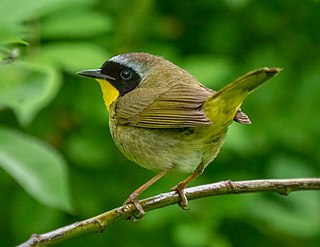
The common yellowthroat is a New World warbler. In the U.S. Midwest, it is also known as the yellow bandit. It is an abundant breeder in North America, ranging from southern Canada to central Mexico. The genus name Geothlypis is from Ancient Greek geo, "ground", and thlupis, an unidentified small bird; thlypis is often used in the scientific names of New World warblers. The specific trichas is also from Greek; trikhas is a kind of thrush, the word being derived from trikhos, "hair".

The mourning warbler is a small songbird of the New World warbler family. Mourning warblers are native to eastern and central North America as well as some countries in Central America. They are neotropical migrants and tend to be found in dense second growth forests. They are under the Wood-warbler category, which consists of arboreal and terrestrial colorful passerines. Wood warblers are in the order Passeriformes, which are perching birds including more than half of all bird species, and the family Parulidae which also includes the Common Yellowthroat, Black and White Warbler, Nashville Warbler, ovenbird, and American Redstart. They are very similar to the MacGillivray's Warbler in appearance, especially in females and immature birds, but their breeding range does not overlap into the west.

The ashy-headed goose is a species of waterfowl in tribe Tadornini of subfamily Anserinae. It is found in Argentina and Chile.

The Kentucky warbler is a small species of New World warbler. It is a sluggish and heavy warbler with a short tail, preferring to spend most of its time on or near the ground, except when singing.

MacGillivray's warbler is a species of New World warbler. These birds are sluggish and heavy warblers, preferring to spend most of their time on, or near the ground, except when singing.
The masked yellowthroat is a New World warbler. It has a number of separate resident breeding populations in South America. The black-lored yellowthroat and southern yellowthroat were formerly considered subspecies.

The Altamira yellowthroat is a New World warbler. It is a resident breeding bird endemic to the Gulf slope of northeastern Mexico.

Belding's yellowthroat is a New World warbler. It is a resident breeder endemic to the southern Baja California Peninsula (Mexico).

The Bahama yellowthroat is a New World warbler. It is a resident breeder endemic to the Bahamas.
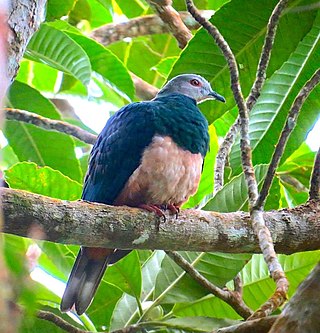
The pink-bellied imperial pigeon, also known as the zone-tailed pigeon, is found in the Philippines. It is a large fruit-eating bird reaching sizes of up to 42cm long.

The West Mexican chachalaca is a species of bird in the family Cracidae, the chachalacas, guans, and curassows. It is endemic to Mexico.
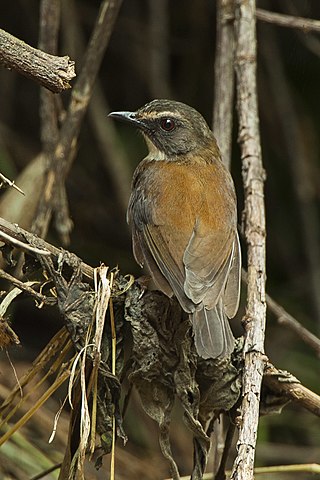
The brown-chested alethe is a species of bird in the family Muscicapidae. It has a discontinuous range of presence across the African tropical rainforest.

The hooded yellowthroat is a species of bird in the family Parulidae. It is endemic to the highlands of Mexico north of the Isthmus of Tehuantepec. It is resident in dense semiarid to humid montane shrubland or chaparral.

The olive-crowned yellowthroat is a species of bird in the family Parulidae. It is found in Colombia, Costa Rica, Ecuador, Honduras, Mexico, Nicaragua, and Panama. Its natural habitats are subtropical or tropical moist shrubland and heavily degraded former forest.

The black-polled yellowthroat is a species of bird in the family Parulidae.
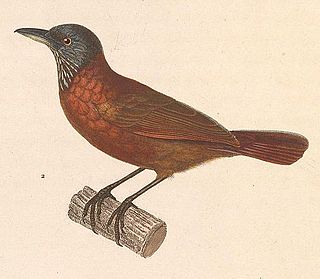
The grey-headed babbler is a species of bird in the family Timaliidae. It is found in Brunei, Indonesia, Malaysia, and Thailand. Its natural habitat is subtropical or tropical moist lowland forest.
The salt marsh common yellowthroat,, is a subspecies of the common yellowthroat, a New World warbler.
Poliocephalus and its counterparts poliocephala and poliocephalum are Greek words meaning 'grey-headed'. Poliocephalus is the name for a genus of grebes, while Poliocephala is the name for a genus of flies. The two words are often used as the second word of a binomial name.

The black-lored yellowthroat is a New World warbler. It has a number of separate resident breeding populations in South America from western Ecuador to western Peru. It was previously considered a subspecies of the masked yellowthroat.
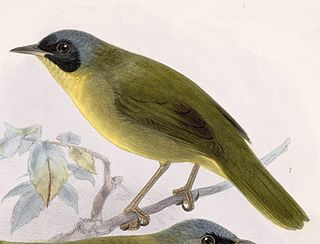
The Chiriqui yellowthroat is a New World warbler. It has a number of separate resident breeding populations in Central America from southwestern Costa Rica to Panama. It was previously considered a subspecies of the masked yellowthroat.


















